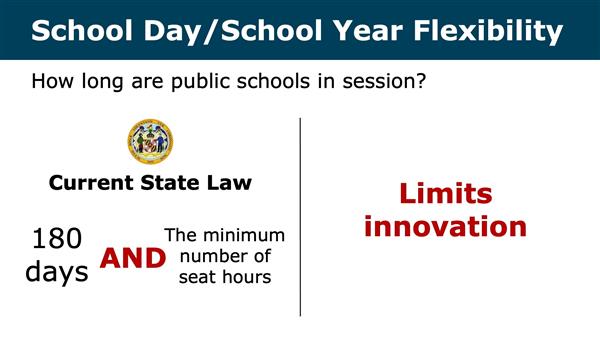- Anne Arundel County Public Schools
- Straight from the Supt - a Periodic Column - February 6, 2024
-
School Calendar Flexibility Legislation is Key to our Ability to Innovate
By Mark T. Bedell, Ed.D.
February 6, 2024 The 2024 session of the Maryland General Assembly is in full swing. Among the pieces of legislation lawmakers are considering is one that would provide calendar flexibility for our school system and allow us to begin to implement innovative school scheduling pilot programs that don’t necessarily fit within the constraints of a traditional school day.
The 2024 session of the Maryland General Assembly is in full swing. Among the pieces of legislation lawmakers are considering is one that would provide calendar flexibility for our school system and allow us to begin to implement innovative school scheduling pilot programs that don’t necessarily fit within the constraints of a traditional school day.Maryland law currently mandates that schools be open each year for a minimum of 180 days and a certain number of hours: 1,080 at the elementary and middle school levels and 1,170 at the high school level. Those requirements – and the need to meet both criteria – place constraints on school schedules that limit programmatic creativity and result in headaches for families.
For the second consecutive year, one of our Board’s legislative priorities is to seek a change in this model and move to a system that keeps the required number of hours but removes the 180-day mandate. This dual requirement is arbitrary and outdated, and it unnecessarily restricts our ability to best meet the needs of our students, staff, and communities. Additionally, it runs contrary to a key component of the Blueprint for Maryland’s Future: innovation.
The flexibility created by passage of this legislation would allow us to pilot innovative scheduling models that could improve morale and achievement for students and staff. Those may include, as an example, a four-day school week for students who meet the requirements to be deemed College and Career Ready. That’s just one idea.
To be clear, we are not seeking to move to a four-day school week for our entire system. Such a move would wreak havoc on family schedules and would not be in the best interests of the majority of our children, especially those at the elementary level. It’s not even a discussion.
We would, however, like to be able to have discussions about implementing alternative schedules where they would better meet the needs of students. The ability to take better advantage of internship and work experience opportunities are clear examples. But we can’t give any meaningful thought to any of it without a change in the law.
Such an alteration could also eliminate or greatly reduce something most families dislike greatly about our school calendar: early dismissal days. Those days currently still count toward the 180-day requirement each year, but with calendar flexibility we could explore ways to remove some or all from the calendar.
A small addition of time to the school day – 10 minutes, for example – could provide sufficient hours over the course of the year to get rid of the early dismissals at the end of each of the four marking periods. Of course, we would need to work with our teacher’s association and other bargaining units to ensure sufficient time is put in place to allow teachers to finalize grades and meet other contractual agreements.
What is undeniable, though, is that eight more full days of instruction instead of partial days during the school year would be far better for students. The structure could also lead to full days of professional development for staff, which would also be full days for families to spend with their children.
The possibilities are endless, and we could find ourselves down the road with several schedules that meet student needs in various ways. We can’t even begin the journey down that road, however, without the change in legislation. Of course, we will actively engage our students, families, staff, and other stakeholders on any innovative school scheduling pilot program we pursue.
"Straight from the Supt.," featuring information about key school system issues directly from Superintendent of Schools Dr. Mark Bedell, is published monthly in this space.



